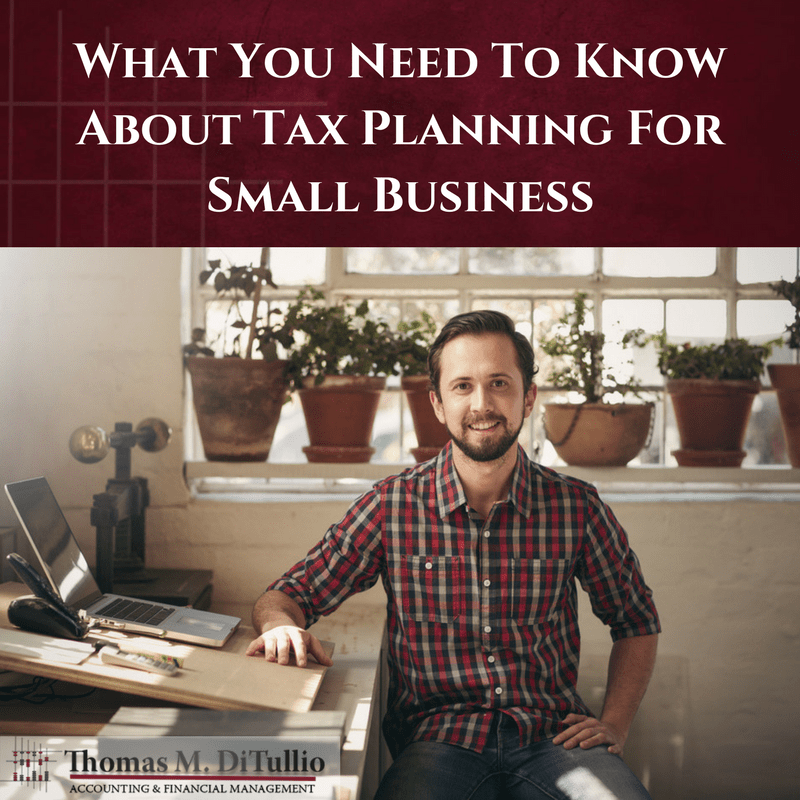What You Need To Know About Tax Planning For Small Business
Some small business owners make the mistake of failing to think about their taxes until the time for filing is drawing close. Instead, tax planning should be a continuing process. At Thomas M. Ditullio Accounting, our team of professionals understands the importance of tax planning, and we work closely with our clients to help them to save money when they file.
What is tax planning for small businesses?
When you engage in tax planning, it involves the process of considering your different options in order to inform you about how you should conduct your transactions in such a way that you might be able to reduce or eliminate your tax liability. Reviewing your expenses and income each month and meeting with your tax professional at Thomas M. Ditullio Accounting at least quarterly might help you to analyze how to take advantage of the deductions, credits and tax provisions that are available to you. It is important for you to understand that using the provisions fraudulently in order to reduce your business’s tax liabilities is considered to be illegal tax evasion. Tax planning is instead a legal way to help you to reduce the tax burden that your business might otherwise face.
Factors that the IRS may consider when it is determining fraud
There are four primary areas that the IRS tends to focus on in order to determine whether or not a business has committed fraud, these include:
- Failing to report substantial income, dividends or a portion of receipts
- Claiming improper or fictitious deductions
- Accounting irregularities such as not keeping good records
- Improperly allocating income to related taxpayers in lower brackets
It is very important that you avoid these improper tax strategies.
Strategies for small business tax planning
There are numerous tax strategies that you may have available to you. Your tax planning strategy should be based on its structure in order to accomplish some of the following goals:
- Getting a lower tax rate
- Reducing your taxable income
- Claiming the available credits and deductions
- Controlling when taxes have to be paid
- Minimizing the effect of the alternative minimum tax
- Avoiding tax errors
It can be very difficult to come up with exact estimates, but you are likely already projecting your revenues, cash flow and income for your general planning purposes. The more accurate that your estimates are, the likelier that your tax planning efforts will be successful.
Business entertainment expenses
One legitimate type of deduction that may be available to your business is a deduction for business entertainment expenses. As long as you follow the specific guidelines, these expenses may help you to lower your tax bill. To qualify, the expense must have been incurred either after, during or before a business discussion. The location must be one that is reasonably conducive for business. For example, while a quiet restaurant may pass muster, it is unlikely that a dance club will. Locations that are generally considered to be too distracting include sporting events, hunting trips, skiing trips and theaters. You may take up to 50 percent of your entertainment expenses as a deduction, but you must have good records to support them. The purpose of the meeting must have been arranged for business purposes.
Automobile deductions for businesses
Certain deductions for maintenance and operating costs for your vehicle may be deductible as business expenses if you use it to conduct business. You may be able to deduct the mileage expenses that are allowed by the IRS. The amounts change from year to year, so you will want to talk about the amounts with your tax professional at Tom Ditullio Accounting.
You might be able to maximize your available vehicle deductions if you own two vehicles by including both in your deductions. Your business miles that are driven are determined by your business use. To figure that out, you divide the business miles that were driven by the total miles for each vehicle. This can result in substantial deductions. It is very important that you keep good records, including mileage logs and receipts.
Time spent working at home
Understanding the home office deduction is important, but it is also complicated. If you have a home office, you will need to understand how to conduct business at home in a manner that will allow you to take the deduction. In order to deduct home office space, it must be located in a room that is not used for other purposes. You should also make its purpose stand out by displaying your business phone number and business address on business cards, having your business visitors sign a guest book when they visit and keeping a time and work activity log. You should also keep copies of all of your paid invoice and your receipts. This helps by making it significantly easier to figure out the percentages that should be allocated to your business use of your home.
Under Section 179 of the tax code, you can take immediate deductions for qualified business property that you purchase up to a certain limit. The equipment may be used or new, and it includes some software expenses. Even if you do not qualify for the home office deduction, there may be some deductions that you can still take. Meeting with your tax professional can help you to figure out what deductions might be available to you. To learn more about tax planning, contact Thomas M. Ditullio Accounting today by calling us at 856.228.2205.

